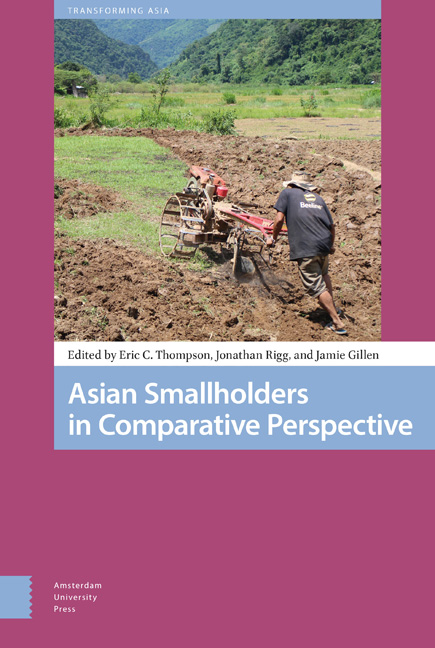Book contents
- Frontmatter
- Contents
- List of Maps, Figures and Tables
- Preface
- Introduction: Asian Smallholders in Comparative Perspective
- 1 Cambodia: Political Strife and Problematic Land Tenure
- 2 Indonesia: Whither Involution, Demographics, and Development?
- 3 Japan: Government Interventions and Part-time Family Farming
- 4 Laos: Responding to Pressures and Opportunities
- 5 Malaysia: The State of/in Village Agriculture
- 6 The Philippines: Fragmented Agriculture , Aquaculture, and Vulnerable Livelihoods
- 7 Singapore: Making Space for Farming
- 8 Taiwan: Toward the Revitalization of Smallholder Agriculture
- 9 Thailand: The Political Economy of Post-Peasant Agriculture
- 10 Vietnam: From Socialist Transformation to Reform
- Index
10 - Vietnam: From Socialist Transformation to Reform
Published online by Cambridge University Press: 21 November 2020
- Frontmatter
- Contents
- List of Maps, Figures and Tables
- Preface
- Introduction: Asian Smallholders in Comparative Perspective
- 1 Cambodia: Political Strife and Problematic Land Tenure
- 2 Indonesia: Whither Involution, Demographics, and Development?
- 3 Japan: Government Interventions and Part-time Family Farming
- 4 Laos: Responding to Pressures and Opportunities
- 5 Malaysia: The State of/in Village Agriculture
- 6 The Philippines: Fragmented Agriculture , Aquaculture, and Vulnerable Livelihoods
- 7 Singapore: Making Space for Farming
- 8 Taiwan: Toward the Revitalization of Smallholder Agriculture
- 9 Thailand: The Political Economy of Post-Peasant Agriculture
- 10 Vietnam: From Socialist Transformation to Reform
- Index
Summary
Abstract
Since 1945, smallholders in Vietnam have been buffeted by three major sets of policies: communist-inspired land reform policies; a collectivization movement that created agricultural cooperatives dating from 1958; and reform policies that were progressively introduced from the early 1980s. Today, smallholders in Vietnam face shrinking landholdings, land fragmentation, and an ageing agricultural labour force. To address these, and other challenges, smallholders have adopted a variety of strategies including diversifying their livelihoods into non-agricultural activities, letting out land to enterprises, accumulating land through rental agreements, shifting production from the household to farm scale, and letting agricultural land lie fallow. These strategies reflect the persistence and transformation of the smallholder against the backdrop of changing Vietnamese economy and society.
Keywords: agricultural cooperatives, land reform, reform policy, smallholder, Vietnam
Vietnam has long been a predominantly agricultural country. Many researchers (Đặng Kim Sơn 2010: p. 331-358; Nguyen Van Khanh 2014: p. 11) assert that agriculture, peasants, and the countryside are the three constant features linked closely with the development of Vietnam. In traditional Vietnamese society, agricultural production was considered essential. There is even an old local saying which goes “agricultural production is the root of society” (dĩ nông vi bản).
Throughout much of its recorded history, the ups and downs of agricultural production in Vietnam have depended partly on natural conditions, but mainly on state policies. In the early twentieth century, during the colonial period under French rule, Vietnam was one of the world's top rice-exporting countries (Nguyen Van Khanh 2014: p. 11). However, around 1945, as a result of the policies of the Japanese and French rulers, agricultural production in Vietnam stagnated. This led to famine in 1945, leaving millions of victims faced with starvation. During the collectivization period from 1958 in the north to the reform period in the 1980s, agricultural production in Vietnam became increasingly underdeveloped (Nguyen Van Khanh 2014: p. 12). Consequently, Vietnam went from being one of the top rice-exporting countries to a country which had to import large amounts of food every year. In 1976, Vietnam imported 1.2 million tons of food. This figure increased to 2.2 million tons in 1979 (Nguyễn Sinh Cúc 1991: p. 9). To address this issue, initial experimental agricultural reforms were conducted in 1980 and official reforms started in January 1981 (Đặng Phong 2014: p. 238, 245).
- Type
- Chapter
- Information
- Asian Smallholders in Comparative Perspective , pp. 307 - 344Publisher: Amsterdam University PressPrint publication year: 2019



